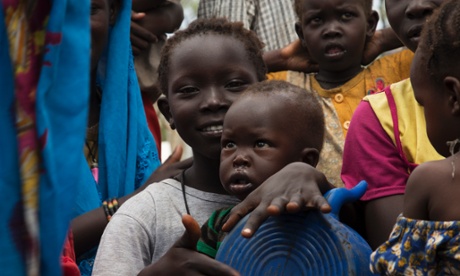
‘Hot’ music
The first night I arrived at Yusuf Batil camp in South Sudan, I was drawn from my tent around midnight by the sound of music coming from all around.
I was there to accompany filmmaker Hajooj Kuka during the filming of Beats of the Antonov, his documentary about music, resistance and the fight for identity among the people stuck in the rebel-held areas of the Blue Nile and Nuba Mountain regions. Throughout 2014 they have been subject to a campaign of bombing by Omar al-Bashir’s forces, who thinks there is no place for them in Sudan. Many fled to the new country in the south.
I walked in the direction of a giant bonfire with more than 100 people circled around it. The man playing sang and the women responded to him, stomping out a fast rhythm in a circle. Running in the centre of them all, a man with a long whip kept flicking their feet to make the dance “hotter”.
Listening to the music being played in the camps made me realise that what makes up Sudanese identity in national rhetoric is a delusion: it doesn’t include everyone in it. It was liberating to hear such a plurality of styles being explored across genders and ages – it allowed me to see a whole different way of being Sudanese that I was never allowed to be exposed to. It’s a way of being that within the popular paradigm is considered as non-Sudanese. This music challenges that in a profound way.
An electric sound - Jodah and Blue Nile music
We spent a lot of time with Jodah, a local musician living in the camp, during our time there. With his rebaba – a traditional instrument known by many different names throughout Sudan – he introduced us to traditional Blue Nile music.
He was an essential part of why Hajooj and I went out to the camps to record music in the first place. The music of the camps, and his music, is some of the most exciting I’ve heard coming from Sudan.
Jodah adds his own flair. In this song, he has taken a boom box and removed one of the speakers, switching the wires around so that he can sing into it. As a result his voice is weirdly amplified by the remaining speaker. Of course, this is all powered by batteries – there’s no electricity in the camps.
The result is this magical auto-tune analogue sound: it’s like rave music, it crackles, it’s so fast.
His rebaba is made from an old pot, an old lid, remnants of a battered UNHRC tent, and broken motorcycle brake cables for the strings. It’s an electric sound.
Girls’ music
‘Girls’ music’ has always been considered as something to pass the time, and was historically pigeon-holed as merely wedding music. But Girls’ music – sung by groups of girls, which has now become its own genre – is a fusion of women’s musical styles across many of the ethnic groups in the region. It thrives across the country from Khartoum to Nyala, where a lot of different tribes meet, mixing simple words over a fast rhythm called the Tumtum.
The presence of women in the public sphere is tense in Sudan. For a woman to do much beyond singing is usually vilified. It’s much like the 1950s jazz approach – that women are just “songbirds”, as if women who play music are just glorified parrots.
But in Girls’ music, women take centre stage, and their friends and community become active participants in any performance through call and response, completely reconfiguring the rules around public space and the presence of women. There’s also no ownership over the lyrics: in the mix of simple words over fast beats everyone is free to participate. It’s liberating.
In this way, it also becomes a powerful form of social and political commentary, often concealed in wry lyrics. It pushes back against the closing down of what a Sudanese identity can be.
I heard Girls’ music everywhere, and this to me felt like true Sudanese music – they sing it in Khartoum, in Juba, in Nyala, in Darfur. It’s the most popular in terms of tape sales too.
Captain Abass
Beyond just exploring the music all around us, we also requested our local contacts to gather their favourites. The song below is performed by one of the region’s most popular musician, Captain Abass. From what I can gather, Abass is a local hero and everyone shares his music on their phones.
He likes to drink before he performs, so he never goes on Sudanese TV as he told me “those Muslim Brotherhood people ask too many questions”.
Collectivity
What does it mean to be a musician in the camps? Everyone there is doing a thousand things at once – they’re trying to survive. Nobody is only a musician. But at no point is music separated from the community.
Like most of the music being played on grounds of Yusuf Batil, the next recording was of another impromptu gathering of men and women. Forming a large circle, a number of hollowed pipes in different lengths are passed around between the men, and are collectively blowed creating a choir of notes. Without a large group its impossible to create the full sound. The tempo is kept by a younger boy holding a gourd, while the players gather around him and stamp the tempo collectively.
The women create a soundscape of calls and sounds while moving inwards and away from the smaller circle of zumbara players. It creates a wave-like effect, throwing clouds of dust up into the air. It’s very beautiful to watch too.

